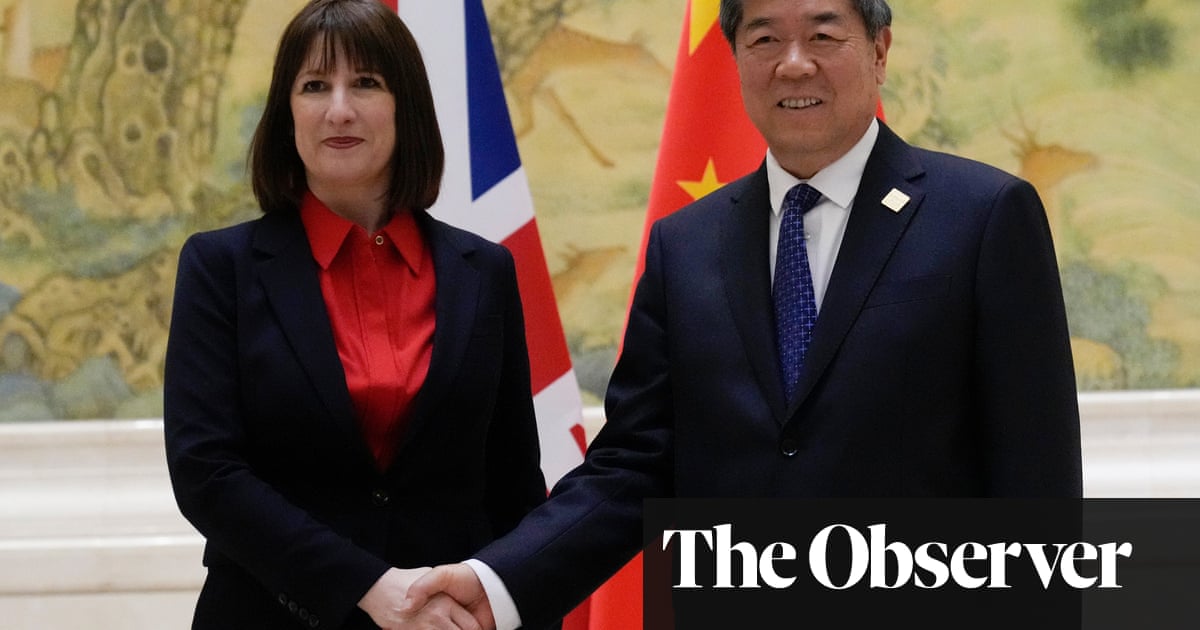Yang Tengbo says he's not spy, he loves Britain and 'would never do anything to harm interests of UK'
Yang Tengbo has released a statement saying that to call him a spy is “entirely untrue”. He says he loves Britain and “would never do anything to harm the interests of the UK”.
Here is the statement in full.
Due to the high level of speculation and misreporting in the media and elsewhere, I have asked my legal team to disclose my identity. I have done nothing wrong or unlawful and the concerns raised by the Home Office against me are ill-founded. The widespread description of me as a ‘spy’ is entirely untrue.
This is why I applied for a review of the Home Office decision in the first place, and why I am seeking permission to appeal the SIAC [special immigration appeals commission] decision. It is also why an order extending my anonymity up to the point of determination of the appeal process was granted.
I have been excluded from seeing most of the evidence that was used against me under a process which is widely acknowledged by SIAC practitioners as inherently unfair: decisions are made based on secret evidence and closed proceedings, which has been described as “taking blind shots at a hidden target”.
On their own fact finding, even the three judges in this case concluded that there was ‘not an abundance of evidence’ against me, their decision was ‘finely balanced’, and there could be an ‘innocent explanation’ for my activities. This has not been reported in the media.
The political climate has changed, and unfortunately, I have fallen victim to this. When relations are good, and Chinese investment is sought, I am welcome in the UK. When relations sour, an anti-China stance is taken, and I am excluded.
I am an independent self-made entrepreneur and I have always aimed to foster partnerships and build bridges between East and West. I have dedicated my professional life in the UK to building links between British and Chinese businesses. My activities have played a part in bringing hundreds of millions of pounds of investment into the UK.
I built my private life in the UK over two decades and love the country as my second home. I would never do anything to harm the interests of the UK.
Key events Show key events only Please turn on JavaScript to use this feature
Lindsay Hoyle, the Speaker, tells Jarvis that the government should have agreed to give a statement on this. It should not just be responding to an urgent question, he says.
And he tells Iain Duncan Smith that he should not have told the media in advance about his plan to table this UQ.
Home Office minister tells MPs foreign influence registration scheme won't be operational until summer 2025
Dan Jarvis, a Home Office minister, is responding. He says the government is glad that the Home Office’s decision to exclude Yang Tengbo in this case was upheld by the courts.
He says the head of MI5 has said the UK is facing the most complex threat environment he has ever seen.
The National Security Act is essential, he says. He says six people have already been charged under the Act.
And, on China, he says the government’s position is to challenge where it must, compete where it has to, and cooperate where it can.
He says the details of the foreign influence registration scheme (FIRS) will be set out in the new year, and the scheme will come operational in the summer, he says.
Speaker tells MPs not to criticise Prince Andrew ahead of urgent question on alleged Chinese spy
Lindsay Hoyle, the Speaker, says the Commons starts court sub judice rules. It is important that MPs do not subvert what courts have to decide, he says.
He says a court has decided to lift the anonymity ruling in the case of the alleged Chinese spy.
He also says MPs are only allowed to criticise the conduct of members of the royal family when they are debating a substantive motion covering that. That is not the case this afternoon, he says.
The Commons urgent question on China will start imminently.
Badenoch says replacing most taxes with flat tax 'very attractive' in principle - but currently unaffordable

Helena Horton
Kemi Badenoch has said that she finds the idea of introducing a flat tax “very attractive” in principle – but unaffordable at present.
She made the comment in response to a question at the event this afternoon organised for groups campaigning about the extension of inhertance tax to farms. Asked by a business owner if she would consider getting rid of most taxes and replacing them with a flat tax, a single rate of income tax for everyone, she replied:
This is an idea that I’ve heard many times. It’s very attractive, but if we’re going to get to that sort of scenario, there’s a lot of work we need to do first hand.
At the moment, we are a welfare state with a little bit of a productivity attached to it. We’ve got to turn that around.
We cannot afford flat taxes where we are now. We need to make sure we rewire our economy so that we can lighten the burden of tax and the regulation on individuals and on those businesses that are just starting out, in particular.
People see the businesses that close. They don’t see the businesses that never started in the first place.
Tory rightwingers have long been attracted by the idea of a flat tax. When Liz Truss was preparing to take over as prime minister, Jacob Rees Mogg urged her to get rid of all direct taxes and replace them with a flat rate of income tax, set at 20p in the pound. He was inspired by the version in Estonia and he claimed it would cost £41bn. Truss reportedly described this as a “great idea”, but even she drew the line at implementing.
As well as cost, another disadvantage with flat taxes is that they do not allow scope for exemptions – like the one farmers have enjoyed from inheritance tax.
What Rayner says about 'unprecedented new powers' being given to mayors in England
In her speech this afternoon Angela Rayner, the deputy PM, said that, as well as extending the number of mayoral authorities, she would be given them “unprecedented new powers”. Here is the passage from the speech where she explained what those powers would be.
Too often, mayors hands are tied by Whitehall … So we will create a clear and transparent route for all mayoral combined authorities to receive an integrated settlement.
This means moving resources between projects that matches what the people need.
We will give mayors new powers over strategic planning and new call-in powers so that they can build the homes we need and plan for growth on a larger scale.
And we will get mayors working more closely with Homes England to unlock new homes.
The most mature areas will be able to set the strategic direction of any future affordable homes programme.
We will devolve future funding to support regeneration and housing delivery, and we will consolidate adult skills funding, introducing joint ownership of the local skills improvement plan and new routes to influence 16 to 19 provision.
And we will devote funding to support economically inactive people into work, and funding for retrofit will be included in the integrated settlements by the end of the parliament.
We will also create a statutory role for mayors in governing the rail network, with a right to request on rail devolution.
This all means easier commutes, across more joined-up transport links, new homes properly connected to local infrastructure and skills provision that matches local job opportunities.
And this is how she summed up the plans.
We have an economy that hoards potential and a politics that hoards power. So our devolution revolution will deliver the greatest transfer of power from Whitehall to our communities in a generation, empowering those communities to realise their potential.
No other government has been this ambitious about devolution, a mission that binds all departments across government, a long-term mission over generations rather than a short-term fix.

Yang Tengbo says he's not spy, he loves Britain and 'would never do anything to harm interests of UK'
Yang Tengbo has released a statement saying that to call him a spy is “entirely untrue”. He says he loves Britain and “would never do anything to harm the interests of the UK”.
Here is the statement in full.
Due to the high level of speculation and misreporting in the media and elsewhere, I have asked my legal team to disclose my identity. I have done nothing wrong or unlawful and the concerns raised by the Home Office against me are ill-founded. The widespread description of me as a ‘spy’ is entirely untrue.
This is why I applied for a review of the Home Office decision in the first place, and why I am seeking permission to appeal the SIAC [special immigration appeals commission] decision. It is also why an order extending my anonymity up to the point of determination of the appeal process was granted.
I have been excluded from seeing most of the evidence that was used against me under a process which is widely acknowledged by SIAC practitioners as inherently unfair: decisions are made based on secret evidence and closed proceedings, which has been described as “taking blind shots at a hidden target”.
On their own fact finding, even the three judges in this case concluded that there was ‘not an abundance of evidence’ against me, their decision was ‘finely balanced’, and there could be an ‘innocent explanation’ for my activities. This has not been reported in the media.
The political climate has changed, and unfortunately, I have fallen victim to this. When relations are good, and Chinese investment is sought, I am welcome in the UK. When relations sour, an anti-China stance is taken, and I am excluded.
I am an independent self-made entrepreneur and I have always aimed to foster partnerships and build bridges between East and West. I have dedicated my professional life in the UK to building links between British and Chinese businesses. My activities have played a part in bringing hundreds of millions of pounds of investment into the UK.
I built my private life in the UK over two decades and love the country as my second home. I would never do anything to harm the interests of the UK.
Andrew Lloyd Webber lets London Palladium be used for protest meeting about inheritance tax extension

Helena Horton
Opposition parties and farmers have taken over the London Palladium today to run a conference opposing Labour’s changes to inheritance tax which they says risks putting family farms out of business.
Andrew Lloyd Webber has lent the palatial theatre to farmers, as his land will also be subject to inheritance tax. Speaking under the sparkly Robin Hood pantomime set - the panto is taking place shortly after the conference - shadow environment secretary Victoria Atkins vowed the Conservatives will reverse the tax changes if they get back into government. She said:
You are the families that work day in day out. Your children are on the farm as soon as they can squeeze a pair of wellies onto their feet. You are the families that this Christmas Day will be having your fun and enjoying Christmas Day, but you’ll also be out on the farm, feeding livestock, making sure that everything is ticking over whilst everybody else is enjoying the Christmas lunches that you and our farmers have produced. You are the families that continue working well beyond retirement age, because that’s what farming is. It’s not a job. It is a way of life. It is a vocation.
Liberal Democrat environment spokesperson Tim Farron also spoke. He said:
The narrative that is put out there is that these are wealthy, wealthy people who should be paying inheritance tax like everybody else. And that’s a complete nonsense when you understand the reality of life … the typical farmer in my community is sitting on a farm that may be worth millions of pounds, and typically they will be earning significantly, significantly less than the minimum wage.

Government publishes English devolution white paper
The Ministry of Housing, Communities and Local Government has now published the English devolution white paper.
Q: What evidence is there that mayors make a difference?
Rayner says she thinks that the evidence is there. She cites growth as one factor. And transport connectivity is another factor, she says. But she says mayors are frustrated because they think, with more powers, they could deliver more.
She says there is potential growth worth billions that can be unlocked.
Q: What role will transport play in your growth mission?
Rayner says transport in the north-west, around Manchester, is a nightmare. She wants Manchester to have a transport system as the one in place in London.

Q: Will all elections next May go ahead? If they don’t, people will feel a right has been taken away?
Rayner says the government is not looking at delaying local elections. It wants reform. If they get to reform quickly, that is an issue they might come to.
Q: How long will it take to bring in these strategic planning powers?
Rayner says some of this will be in the devolution bill. But some collaboration is happening already, she says.
Alleged Chinese spy who befriended Prince Andew can be named as Yang Tengbo, judge rules
The alleged Chinese spy who got close to Prince Andrew as a way to gain access to the UK establishment has been named as Yang Tengbo, a businessman also known as Chris Yang, Jessica Elgot and Peter Walker report.
Rayner is now taking questions.
Q: Mayors want powers over post-16 education. What will happen if mayors want powers you are not willing to give them?
Q: How can I explain to people what this will mean to voters?
Q: Some mayors want fiscal devolution – things like a tourism tax. You are not offering that. Could that change?
Rayner is answering all three questions together.
She says Whitehall will have to give a good reason if it is refusing requests for new powers from mayors.
On taxation, she says mayors will have more flexibility over who they use council tax receipts.
She says she has never seen a more “scary’” group than what she calls “the pride” of Labour mayors. She says they are sharing information.
She says she expects them to demand more.
UPDATE: Rayner said:
There is kind of a theme here of ‘wow, that is great, but we want more’, which is even better.
It is evolution as well as revolution and you have seen that some areas where we have got combined authorities have gone much further because they have been able to do that, and we want to push that.
This white paper and the bill that we will be putting forward will be a default for devolution, so Whitehall would have to give a good excuse as to why they wouldn’t give those areas the devolution.
We want to make sure we do that whether it is the post-16 skills or any other element.
Rayner says she wants to extend powers for mayors
Rayner says, as well as extending the number of mayoral authorities, she wants to give them more powers.
Rayner says she wants mayors running strategic authorities in England, 'to give cities and regions bigger voice'
Rayner says having the right powers in the right place (the goal of the devolution plans) can revive faith in democracy.
She praises initiatives already taken by Labour metro mayors, including Oxford Street regeneration in London, the train service in Liverpool, buses under local control in Manchester, and clean energy jobs in the East Midlands.
She says the last Labour government introduced devolution for Scotland, Wales and Northern Ireland.
But in England devolution has been a patchwork, she says. She goes on:
Under the Conservatives, devolution has often meant creating a patchwork of individual deals benefiting some parts of the country while other parts have missed out.
Well, no more. With our Plan for Change … it’s time for a completely new way of governing, one that unites public and private sectors, at all levels of government, business, and unions and the whole of civil society.
Rayner says in future devolution “no longer be agreed by the whim of a minister in Whitehall. It will now be default in our constitution”.
Ultimately, our aim is mayoral devolution over areas of genuine strategic scale, and to create strategic authorities as a new tier of local government to give our cities and regions a bigger voice.
And, if local leaders cannot agree on a mayoral model, Whitehall will impose one, she says.
So I will legislate for a new power of ministerial directive which will allow central government to not heads together and create strategic authorities where local leaders cannot agree.
Angela Rayner gives speech on devolution white paper for England
Angela Rayner starts by saying this is a moment that people have been waiting for for a long time – “the turning point when people and places across England finally begin to take back control over the things that matter to them”.

.png) 3 weeks ago
16
3 weeks ago
16













































